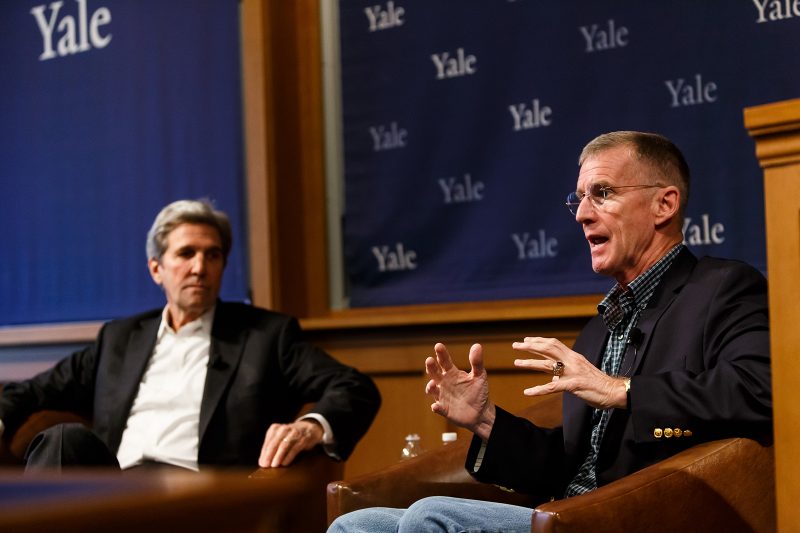Speaking to former Secretary of State John Kerry at Yale’s Greenberg Conference Center, Gen. (retired) Stanley McChrystal emphasized the importance of effective diplomacy and candid dialogue between leaders in global conflict resolution.
In a wide-ranging discussion, Kerry and McChrystal reviewed many aspects of U.S. counterterrorism efforts with a specific focus on Afghanistan, where McChrystal was Commander of U.S. forces and Kerry spent significant time during his tenure as Secretary of State.
The conversation, which took place before a standing-room-only audience in the Greenberg Center Auditorium on Feb. 23, was part of the day-long Yale Special Operations and Interagency Academic Symposium. Other speakers, including faculty scholars, global affairs practitioners and military leaders, addressed a variety of topics under the theme, “the future of U.S. counterterrorism.”
Reflecting on the time he spent in Afghanistan working with former president Hamid Karzai, Kerry encouraged the audience to take the long view when considering the outcomes of U.S. involvement there.
While governance issues, corruption, heroin production and the Taliban insurgency remain obstinate problems in the country, Kerry pointed to significant gains in school enrollment.
“When we started this operation in 2001, there were 800,000 people in school in Afghanistan and they were almost all boys. Now, you have 8 million-plus, and 45% or so are girls. That’s change in the making.”
“You have a young generation coming up, who are educated, who have a different attitude, and want a different future,” he said.
McChrystal offered a sober assessment of his time in Afghanistan, pointing to the flaws in the U.S. approach. “We failed to take the long view and we got expedient,” he said. “The things I got wrong were things I didn’t know. We were ignorant, not evil, but ignorant, and there was a huge cost to that.”
Kerry and McChrystal wrapped up the 1.5-hour-long discussion by taking several questions from audience members, which included both Yale students and members of the U.S. Special Forces community.
In response to a question on using covert operations, McChrystal warned against overuse of covert actions for solving problems. “Covert is a seductive opportunity. It usually doesn’t work, and it’s never secret in the long term. If you think it’s the ‘easy button,’ it’s usually not,” he said.
“I do think we should use it, but we should use it with caution,” McChrystal added.
The conference was organized by Will Wright, a U.S. Army officer and a second-year graduate student at the Jackson Institute for Global Affairs. Kerry and McChrystal are both Senior Fellows at the Jackson Institute.
